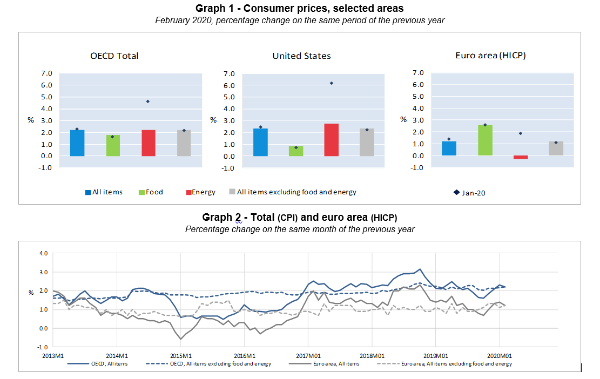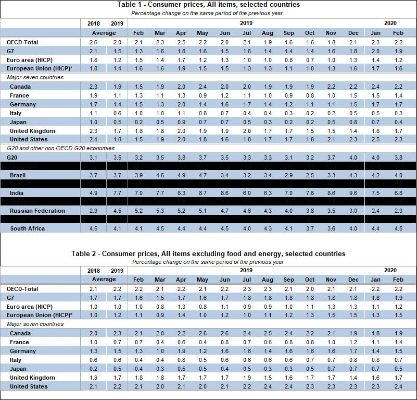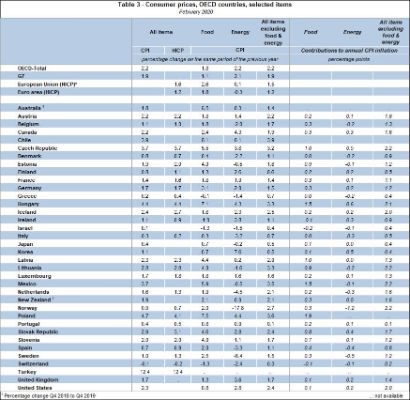OECD Consumer Prices In The Wake Of The Covid-19 Pandemic
OECD annual inflation slowed marginally to 2.2% in February 2020 but provisional data for March show a significant further slowdown in the Euro area, in the wake of the Covid-19 pandemic
Prior to the widespread outbreak of Covid-19 among most OECD economies, annual inflation in the OECD area slowed to 2.2 % in February 2020, compared with 2.3% in January, as energy prices slowed to 2.2% in February compared with 4.7% in January.
Estimates for the OECD area in March are not currently available but Eurostat’s flash estimate[1] for the Euro area points to inflation falling significantly to 0.7% compared to 1.2% in February, almost exclusively driven by declining energy prices with oil prices falling by over half in March.

In February 2020, annual inflation slowed in all major economies except in Germany where it was stable at 1.7%. Annual inflation decreased in Japan (to 0.4%, from 0.7%), the United States (to 2.3%, from 2.5%), Canada (to 2.2%, from 2.4%), Italy (to 0.3%, from 0.5%), and more moderately in the United Kingdom (to 1.7%, from 1.8%) and France (to 1.4%, from 1.5%).
Annual inflation in the Euro area, as measured by the HICP[1], also decreased to 1.2% in February 2020, compared with 1.4% in January.
Annual inflation slowed sharply in Korea (to 1.1% in February, from 1.5% in January), one of the first countries affected by the initial wave of Covid-19 from China, where annual inflation also decreased to 5.2% from 5.4%.
Among non-OECD G20 economies, annual inflation decreased in Argentina (to 50.3% in February, from 52.9% in January), India (to 6.8%, from 7.5%), Brazil (to 4.0%, from 4.2%) and the Russian Federation (to 2.3%, from 2.4%).
Inflation increased in Saudi Arabia (to 1.2%, from 0.7%), Indonesia (to 3.1%, from 2.7%) and South Africa (to 4.5%, from 4.4 %). Annual inflation in the G20[3] area as a whole also decreased to 3.8% compared with 4.0% in January.


[1] Eurostat note: “Data collection for HICP has in many countries been affected by the COVID-19 crisis. The data in this release are, for some countries and for some products, based on fewer prices observations than usual. Nevertheless, the HICP flash estimate for March is considered to be reliable. Eurostat will provide full information to users on the methodologies and approaches that are currently being developed together with the Member States to overcome expected difficulties in price collections”.
[2] HICP (Harmonised Indices of Consumer Prices) published by Eurostat.
[3] On 11 July 2017, the Argentinian Authorities started to publish a new national CPI (December 2016 = 100) covering the whole country. This officially reported CPI-series starts in December 2016, and has now been included in the G20 aggregate, from January 2018 onwards. The inclusion of the Argentinian CPI in the G-20 aggregate entailed a clear break in the series.
Note: Data collections to construct the CPI press release for February 2020 have been largely unaffected by the Coronavirus (COVID-19) outbreak. However measures implemented by many countries to reduce the spread of the coronavirus may impose severe restrictions on the ability to compile national CPIs and other official statistics as of March 2020.


 Cook Islands Investment Incorporation: Government Partners With Communities To Improve Safety Shelters
Cook Islands Investment Incorporation: Government Partners With Communities To Improve Safety Shelters Richard D. Wolff, IMI: Political Economy Contradictions As We Lurch Into 2025
Richard D. Wolff, IMI: Political Economy Contradictions As We Lurch Into 2025 People with Disability Australia - PWDA: CMHA And PWDA Demand Justice And Urgent Reform Following Death Of Simon Cartwright At Silverwater Jail
People with Disability Australia - PWDA: CMHA And PWDA Demand Justice And Urgent Reform Following Death Of Simon Cartwright At Silverwater Jail UNICEF Aotearoa NZ: Vanuatu Quake - UNICEF Aotearoa Launches Urgent Fundraising Appeal For 40,000 Children In Need
UNICEF Aotearoa NZ: Vanuatu Quake - UNICEF Aotearoa Launches Urgent Fundraising Appeal For 40,000 Children In Need New Zealand Defence Force: Surveillance, Aid, Responders And Evacuees Covered By RNZAF Vanuatu Flights
New Zealand Defence Force: Surveillance, Aid, Responders And Evacuees Covered By RNZAF Vanuatu Flights Leonard C. Goodman, IMI: The Democratic Party Faces Its Day Of Reckoning
Leonard C. Goodman, IMI: The Democratic Party Faces Its Day Of Reckoning